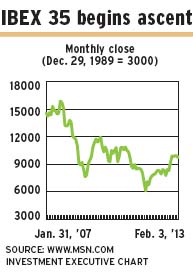
With some economic growth expected in troubled Spain this year, some companies based in that country offer good investment opportunities.
This is despite – and, to some extent, because of – the nation’s economic problems. Investors tend to shy away from equities in troubled economies until those problems are solved. However, it’s worth noting that now is the right time to invest in these companies because share prices will be fully valued by the time the economic problems are resolved.
In fact, stocks on Spain’s IBEX 35, the country’s main stock exchange index, are already up by about 30% since June – and some analysts feel there’s more share price appreciation to come.
Some of the stocks recommended are issued by companies with domestic operations – such as Banco Popular SA and CaixaBank SA – that are expected to benefit from improved domestic demand. Others are issued by global companies – including clothing company Industria de Diserio textil SA (a.k.a. Inditex) and travel-software firm Amadeus IT Holding SA – that will benefit, not only from domestic but also from global economic growth.
Spain was one of the hardest-hit economies in Europe following the global financial crisis, partly because of the collapse of the country’s previously hot real estate market, which had been fuelled by foreigners buying vacation homes.
House prices in Spain have fallen by about 30% since the crisis, but Charles Burbeck, co-head of global equity portfolios with UBS Global Asset Management (U.K.) Ltd. in London, says it looks like they’re starting to stabilize, with institutional investors starting to buy into the market. Burbeck believes this makes Spain’s banks a good investment opportunity, as they’re no longer being dragged down by non-performing mortgages.
In addition, these banks’ share prices are likely to appreciate when the results of the European Central Bank-initiated bank stress tests are released, which is expected in the autumn. Burbeck is confident that many European banks will pass because the authorities know that strong banks are needed to get Europe growing at a decent pace again.
It’s also worth looking at non-financial companies in Spain, which also have become much more competitive with high unemployment – around 25% in total and almost 60% for young people – driving wages down. Unit labour costs are back to 1999 levels, leading to an increase in exports, says Martin Fahey, head of European equities with I.G. International Management Ltd. In Dublin.
Here’s a look at some of the recommended Spain-based stocks:
– Banks. Global banks are a logical first step when starting to invest in an economy that has been weak because it limits exposure to that country. Stephen Oler, portfolio manager with Pyramis Global Advisors in Smithfield, R.I., a unit of Boston-based FMR LLC (a.k.a. Fidelity Investments), and portfolio co-manager of Fidelity Europe Fund, likes Banco Bilbao Vizcaya Argentaria SA (BBVA). “The majority of its profits come from Mexico,” he says, “where it is a dominant player.”
Burbeck also likes BBVA’s exposure to Mexico, noting that its economy is very well leveraged to the pickup in U.S. economic growth. He calls BBVA a “very good franchise” and considers its shares to be attractively priced at around 1.2 times book value.
Burbeck, however, prefers another bank, Banco Santander SA, because its shares, which, at “just over book value,” are cheaper and this bank has more leverage to the economic recovery in both Spain and the U.K. (Housing incentives are kick-starting the U.K. economy.) Santander’s exposure to Brazil isn’t likely to contribute much to the bottom line in the near term, but Burbeck thinks that economy will start to improve toward the end of this year.
Oler, however, isn’t enthusiastic about Santander. He thinks this bank will need to raise capital, which will dilute its shares, and he feels it’s sold off some of its best assets, including a U.S. consumer finance business and part of its operations in Mexico.
Domestic banks
On the domestic side, Oler likes Banco Popular and CaixaBank. He thinks there may be loan growth in the second half of this year, which could have a huge impact on these banks’ margins. He considers Banco Popular to be the highest-quality local bank, with CaixaBank right behind.
Banco Popular is “geared to small and medium-sized business lending,” Burbeck notes, and will do well when those firms start growing again.
A recent report from J.P. Morgan Cazenove (JPMC) in London, a division of J.P. Morgan Securities LLC, has an “overweight” recommendation on CaixaBank – vs “neutral” for Santander and “underweight” for BBVA and Banco Popular – based on CaixaBank’s “deep restructuring.”
– Clothing. Inditex has been extraordinarily successful in the “fast fashion” business, which offers up-to-the-minute fashions at affordable prices. Burbeck says this stock isn’t an “economic recovery” play but more of a “growth” story. Inditex has continued to grow even in Spain, which accounts for about 30% of its revenue, during the past five years.
Peter Hadden, Oler’s colleague at Pyramis, also likes Inditex, saying it’s a very controlled operation with stringent processes and the ability to deliver and move inventory quickly. He notes that Inditex is just starting in the U.S. and is being careful; due to the rise in Internet commerce, shopping at malls isn’t growing by much and some malls are shutting down.
– Travel technology. Amadeus is a software company for the travel industry that caters to both travel agents and airports. The firm has “benefited dramatically,” Hadden says, from increased travel and airport upgrades in periphery Europe and Asia.
A recent JPMC report has an “overweight” rating on Amadeus stock, noting that the firm is just starting to penetrate China’s huge market. Just 5% of that market is open, and it could take five to 10 years – possibly longer – before China is completely open to foreign companies.
© 2014 Investment Executive. All rights reserved.